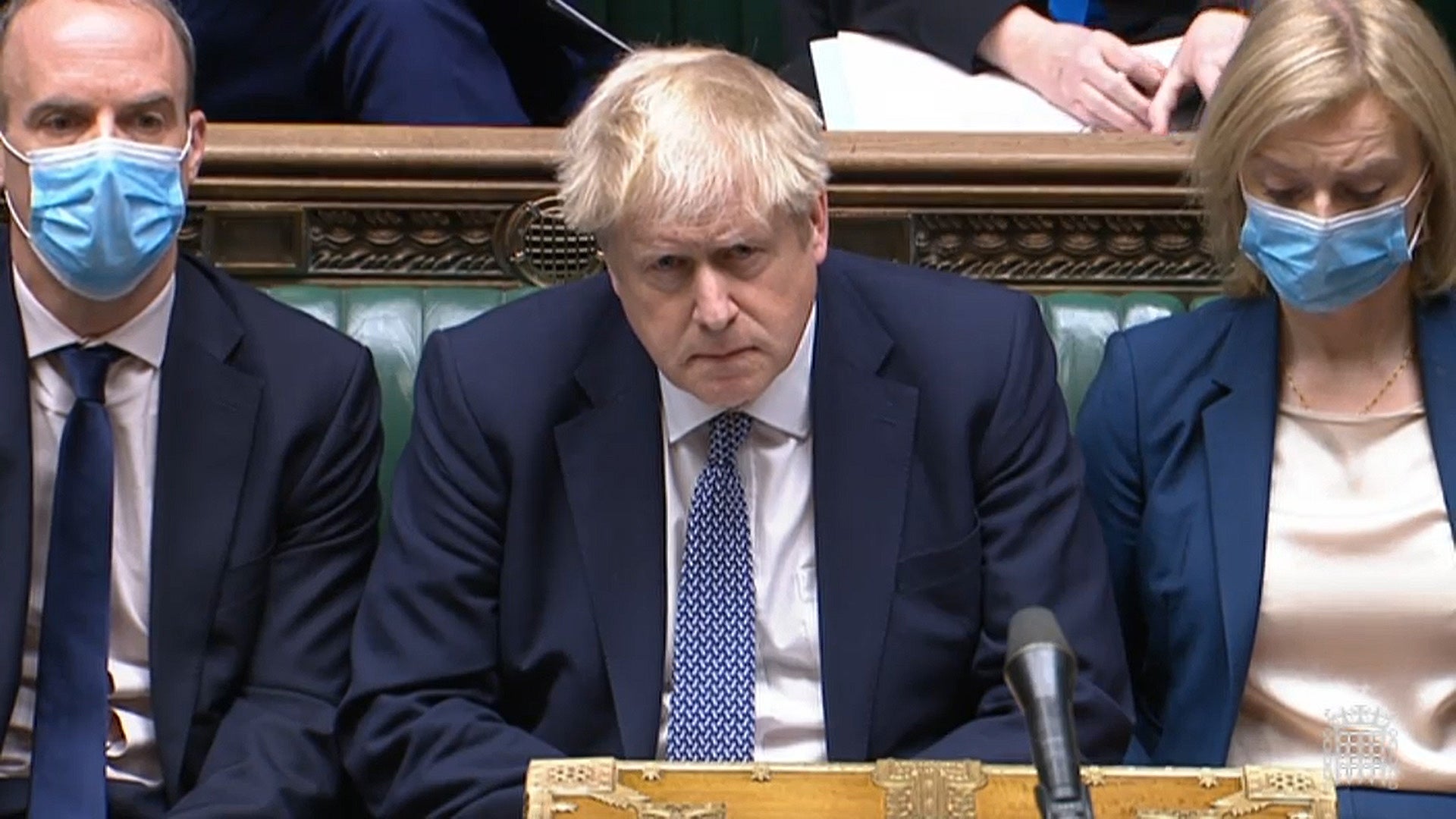Boris Johnson’s defence was ‘ridiculous’ but enough for him to survive – until next week
The prime minister said he thought the party was a ‘work event’ and he was sorry, which got him through his 45 painful minutes in the Commons, writes John Rentoul


The first Conservative MP I spoke to after Prime Minister’s Questions said they thought Boris Johnson’s defence was not enough to save him. Admittedly this MP is not a supporter of the prime minister, but they were convinced that the “emails and the messages” between Tory MPs will be negative: “How can he survive another PMQs like that?”
The prime minister has handed great power to Sue Gray, the civil servant investigating the possible breach of lockdown rules by Downing Street parties. He may think that he is safe because he knows that an impartial civil servant will not want to bring down an elected politician, but the danger for him is that her report will be inconclusive and therefore questions will continue to be asked, and Tory MPs will increasingly decide that the game is up.
Johnson did the only thing he could today, which was to say that he believed the drinks in the Downing Street garden was a “work event”, but that he should have realised it was a bad idea and “sent everyone inside” – and to apologise profusely. After that, he had two answers to every question, which was to repeat his apology and ask people to wait until the inquiry had reported.
The weakness of his defence was visibly painful to him. Keir Starmer’s attack was woundingly accurate: “His defence, that he didn’t realise he was at a party, is so ridiculous that it is actually offensive to the British public.”
The Labour leader did well on what was the hardest parliamentary occasion for him, as much as it was also the hardest for the prime minister. Expectations of Starmer were so high that he was bound to disappoint. His supporters, enraged by Johnson’s evident wickedness (and it was notable that Johnson himself used the word “rage” to describe how the public must see things), expect the leader of the opposition to remove the prime minister on the spot.
Starmer made the case against Johnson without any clever legal questions. He commented that the prime minister’s defence “just isn’t working”, with which Tory MPs silently agreed. He reminded the Commons that Johnson had “pretended to be sickened and furious” that there were parties going on, and that his own staff were laughing about them, but that he attended at least one of them himself.
A leader of the opposition has to be careful in calling for a prime minister’s resignation, because if it doesn’t happen, it makes the opposition look silly once the heat has drained from the issue, as it will. But Starmer decided to go for it, judging that even if it doesn’t happen, the Tory party is going to be so unstable for a while as to make it seem a real possibility.
Starmer was unable to goad Johnson into a partisan response, which would have undermined his apology. Instead the prime minister observed mildly that the leader of the opposition is “paid to try to remove me from office”, and repeated that he “wished things had been done differently”.
Johnson then had to repeat his contrition and his suggestion that MPs should wait for Gray’s inquiry – no one knows when that will be – with only the occasional comment that he “disagreed” with the “party-political advice” offered by opposition MPs.
To keep up to speed with all the latest opinions and comment, sign up to our free weekly Voices Dispatches newsletter by clicking here
It was significant that not a single Tory MP asked a critical question about lockdown-breaking parties. The whips had done a good job of lining up loyalists (and Peter Bone) to ask questions on an unusually wide range of subjects – although by the time we got to Alberto Costa near the end, he ran into opposition jeers by opening his question with the words “washing machines”. It was a serious question about microplastics pollution, but what mattered was that it wasn’t about the events in Downing Street 19 months ago.
That means the Tory party is not yet going to go over the top against its leader, and that the attempt to push Johnson out is still happening behind closed doors. There is no doubt that such an attempt is under way. “We are brutal, ruthless and efficient,” boasted the MP to whom I spoke. But the phrase on most of the rebels’ lips – “it’s now a matter of when, not if” – is a mark of weakness, because as long as it is a question of “when” the answer is likely to be “not yet”.
With an election still more than two years away, I still doubt that there are as many as 54 Tory MPs who think that now is the right time to change leader. (The target number, 15 per cent of Tory MPs, has just come back down from 55 to 54 as a result of Anne Marie Morris losing the whip for voting with Labour on energy bills yesterday.)
They are in a John Maynard Keynes guessing game about other Tory MPs’ intentions, because it is worth triggering the first stage of a leadership contest, a vote of no confidence in the leader, only if they think they will win it, which would require half the parliamentary party to vote against Johnson in a secret ballot. Are we there yet? Even after today’s inadequate defence of the indefensible, I don’t think so.






Join our commenting forum
Join thought-provoking conversations, follow other Independent readers and see their replies
Comments